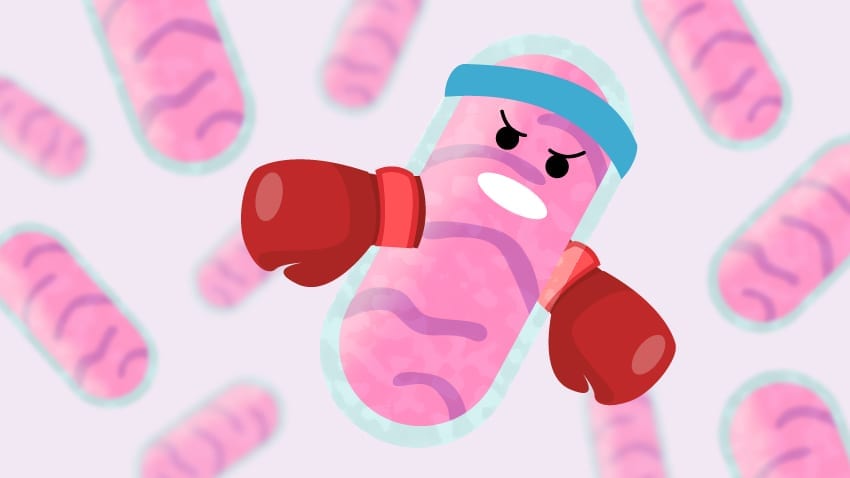Mitochondria are often referred to as the powerhouses of the cell. They help turn the energy we take from food into energy that the cell can use. But, there is much more to mitochondria than just energy production.
Present in almost all types of human cells, mitochondria are vital to our survival. They generate the majority of our adenosine triosphate (ATP), the energy currency of the cell, they help store calcium, and they can even help to generate heat when we are cold. Considering how important mitochondria are, what happens if our mitochondria are not functioning properly? If they are not functioning properly, that means that ATP is reduced – which in turn means that the energy needed for all of the body’s processes is reduced1. This can impact a person’s overall health and wellness.
This reduction in mitochondrial energy production can sometimes result in conditions like chronic fatigue, muscular dystrophy and also Alzheimer’s. Poor energy equals poor energy state, which is a common denominator in almost all chronic diseases, like chronic fatigue, adrenal fatigue, and cognitive issues2.
How Mitochondria and Gut Health are Related
Now that we know more about the mitochondria and what happens if your body’s mitochondria are not functioning properly, let’s see how this ties in with our microbiome. The bacteria in the gut interacts with the body’s cells mostly through the cell’s mitochondria. Studies show that if you improve the gut microbiome, the health of the microbiome will improve the quality and diversity of the mitochondria’s functions.
We have explained before that the gut microbiome is linked with the brain and the immune system. One reason that could explain this is that the gut is where inflammation begins. Most of the body’s immune tissue is located in the gut, and the gut produces cytokines, which are types of proteins that help cells communicate during an immune response. These cytokines help regulate your body’s immune response. They also signal the brain to produce neurochemicals in order to support the inflammation response. These neurochemicals can affect mitochondrial ATP production and also the hormone response involving cortisol. When you have any degree of dysbiosis (microbial imbalance) where the gut flora is out of balance, this can create a state of chronic inflammation in the body, which can act like a negative force on the mitochondrial processes that are so essential to your body and its energy levels3.
How You Can Boost Your Mitochondria
If you’ve been experiencing some unexplained fatigue or sluggishness, not to worry! Here are a few things you can try to give your mitochondria a bit of a “boost,” so to speak.
#1 Make Healthy Food Choices: Try to reduce your intake of sugar and refined carbohydrates, which spike blood sugar, contribute to unwanted pounds and body fat, and lead to mitochondria-damaging inflammation4. Try to avoid processed foods and factory-farmed meats as well.
#2 Move Your Body: We know…as if you needed another reason to exercise. We promise you, your mitochondria really do love when you exercise, especially when you engage in High Intensity Interval Training, which boosts mitochondrial production5. A regular HIIT routine will not only build up muscular endurance, but also the number and size of the mitochondria that power those muscles.
#3 Count Those Sheep: Sleep protects the brain by clearing out neural “waste products” that build up daily. If you do not get enough sleep, then your brain’s waste removal system can’t work to clear out the toxins that build up, which inhibit your mitochondrial function6. So don’t skimp on sleep!
In addition to these lifestyle changes, a supplement like Coenzyme Q10, CoQ10 for short, can also help. CoQ10 is the primary antioxidant that the human cell provides to protect and support mitochondria. Without this vital molecule, the level of ATP that the mitochondria produce drops, and the energy that is available to that tissue decreases7.
We do have some control over how fast or slow we age, and a lot of it comes down to how well we treat our mitochondria. So try following some of these mitochondria-boosting moves and give these tiny “powerhouses” some additional support.
References
- https://www.medicalnewstoday.com/articles/320875.php#disease
- https://www.medicalnewstoday.com/articles/320875.php#function
- https://www.drlamcoaching.com/nem-therapy/inflammation/improve-gut-microbiome-optimal-mitochondrial-energy-production/
- https://drfranklipman.com/2019/04/22/9-ways-to-boost-your-mitochondria-increase-energy-and-enhance-longevity/
- https://drfranklipman.com/2019/04/22/9-ways-to-boost-your-mitochondria-increase-energy-and-enhance-longevity/
- https://drfranklipman.com/2019/04/22/9-ways-to-boost-your-mitochondria-increase-energy-and-enhance-longevity/
- https://www.healthline.com/nutrition/coenzyme-q10
This article is for informational purposes only. This article is not, nor is it intended to be, a substitute for professional medical advice, diagnosis, or treatment and should never be relied upon for specific medical advice.

Share this Post